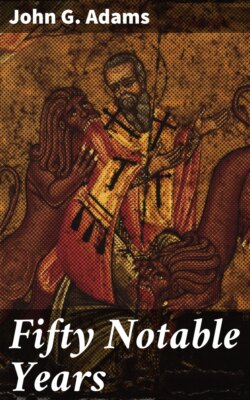Читать книгу Fifty Notable Years - John G. Adams - Страница 7
CHAPTER III.
UNIVERSALISM IN AMERICA.
Оглавление"Christianity is recognized as a democratic element, profitable for all conditions of men, as the Declaration of Independence and our Constitution are the palladium of our civil and religious rights."—Dr. J. W. Francis, author of "Old New York."
UNIVERSALISM in America took its rise with the Republic. The coming of John Murray to our shores, and the proclamation of the gospel of universal grace, was but a little time previous to the issuing of the Declaration of Independence by the American colonies. These colonies had come to the full and bold utterance with which the Declaration opens: "We hold these truths to be self-evident, that all men are created equal; that they are endowed by their Creator with certain inalienable rights; that among these are life, liberty, and the pursuit of happiness." Through ages of light and of darkness this sacred truth had had but little growth or power in the human mind. But it was there, and was not to die there. It lived through all the world's change, commotion, and revolution, and the set time had now come when it should have a clearer and stronger expression and demonstration than our old or new worlds had yet known. This declaration of our fathers signified the inestimable value of man—of every man—to himself, his fellow man, and his God. It asserts the doctrine of human equality, not that all men have the same intellectual or moral capacities, or should possess an equal amount of property, or be invested with the same political privileges; but the religious doctrine that all are of "one blood," children of one Father, protected by one Providence, made to aid, to bless and build each other up in truth, justice, and righteousness henceforth while the world stands. It signifies human equality and human rights in their broadest and most rational sense. As wrote Alexander Hamilton: "All men have one common origin, they participate in a common nature, and consequently have one common right. No reason can be assigned why one man should exercise any pre-eminence among his fellow creatures, unless they have voluntarily vested him with it." It was this conviction, based on a principle, that carried our fathers through the Revolution, and gave to us that Constitution which was afterwards the work of their hands.
The object of this Constitution is explicitly declared, "To form a more perfect union, establish justice, insure domestic tranquillity, provide for the common defence, promote the general welfare, and secure the blessings of liberty to ourselves and our posterity." This signified not the growth and strengthening of a sentiment that would justify the building up of one class upon the subjugation of another. We have a statement of the whole truth in the emphatic language of Mr. Bancroft, as he speaks of the intent of the framers of the Declaration on which our Constitution is based. "The Declaration, avoiding specious and vague generalities, grounds itself with anxious care upon the past, and reconciles right and fact. The assertion of right was made for the entire world of mankind, and all coming generations, without any exceptions whatever; for the proposition which admits of exceptions can never be self-evident. And as it was put forth in the name of the ascendant people of that time, it was sure to make the circuit of the world, passing everywhere through the despotic countries of Europe; and the astonished nations, as they read that all men are created equal, started out of their lethargy, like those who have been exiles from childhood, when they suddenly hear the dimly remembered accents of their mother tongue."[8]
It was meet and right that when this great word went forth to awaken the nations to a new realization, there should be heard at the same time in our land the trumpet notes of that gospel which proclaims the unbinding of the heavy burdens of humanity, liberty to the captives, and the opening of the prison to them that are bound. As Dr. Benjamin Rush, one of the signers of the Declaration of Independence (and a believer in Christian Universalism), in a letter to Rev. Mr. Winchester, alluding to Rev. John Wesley, writes: "His writings will ere long revive in support of our doctrine—for if Christ died for all, as Mr. Wesley always taught, it will soon appear as a necessary consequence that all shall be saved.... At present we wish liberty to the whole world. The next touch of the celestial magnet upon the human heart will direct it into wishes for the salvation of all mankind."
This new political life, upon which our nation entered, signified the equality, true sonship, brotherhood, capability, and earthly destination of man. It meant democracy, not the democracy of numbers merely, nor of political parties struggling for supremacy and the spoils of the victors, but a democracy having in view a common good—the greatest good of all. It means intelligence, thrift, education, and religion for the masses; it means this for one people, means it for all nations of mankind. Precisely this is signified by the re-affirmation on these western shores of that gospel anciently proclaimed to the Athenians by the Christian apostle: "God, that made the world ... hath made of one blood all nations of men, for to dwell on all the face of the earth, ... as certain also of your own poets have said, For we are also his offspring."[9] A common humanity, a common interest and destiny, are declared.
It is a common humanity with which Christ is in sympathy; which makes him who would be highest in the Divine estimation the servant of all; which recognizes the Golden Rule, directs the strong to bear the infirmities of the weak, and men everywhere to be helpers one of another, because their interests are not antagonistic, when the laws that govern their nature are clearly understood. They have unity:
